Those that are familiar with Gold Panda’s work know of his clean perfectionist style, but somehow never missing a smooth layer of finesse and groove.
The British native has made a habit of bringing listeners in with his low slung hip-hop and housey grooves, and his most recent album released in 2016, ‘Good Luck and Do Your Best’ is no different. From a life of jumping from job-to-job, including a sex store, being screamed at while driving airplane passengers to their terminals in a bus, and conning British banks out of more than $15,000, he has really found his calling in a life of music and production. Armed with his trusty AKAI MPC2000xl, he shows no signs of stopping. Stoney Roads were lucky to have a chat to him via Skype ahead of his Australian tour about his plans at the moment and how he found his way to where he is now.
Stoney Roads (SR): Hey man how are you going?
Gold Panda (GP): I’m good thanks how are you?
SR: I’m very very well, what have you been up to lately?
GP: Uhm, what have I been doing? Trying to find some new ways of making music, and yeah that’s it really, just hanging out at home.
SR: Right, what do you mean by that? What kinds of ways of making music?
GP: Well, I’ve always made it in the same way with a drum machine/sampler – an MPC2000xl, and now I’m just trying to work out how to generate sounds… I’m trying to use a laptop but not an audio workstation, I’m trying to do it with pure data and MaxMSP and processing to trigger different things.
SR: Oh wow.
GP: Yeah it’s really fun because you can do anything, but it’s also really good because you can think of something and you can build that thing that doesn’t exist, and it’s a really interesting way of doing things for me.
SR: What made you think of that instead of using a DAW or your MPC?
GP: Well my MPC is great but I feel like I’ve done so much work with it that I just wanted to try something new. I tried to get into modular synthesis, but that’s really expensive. So MaxMSP is like a cheap way of doing that because it gives you all the tools to basically do the same thing, but on something you can just carry around with you. I also like the way you can have a friend who has been using it to do live sets with and he’s made like a light box where the light sensors pick up sounds, and he uses torches to trigger sounds and stuff like that. It’s really cool.
SR: Oh sick, well that’s exciting. So to essentially kick everything off, can you tell us about Good Luck and Do Your Best? How did it come about and what were your inspirations behind it?
GP: Uhm Good Luck and Do Your Best‘s title came from a Japanese taxi driver, who in English said to me “Good luck and do your best”, which I thought was really cute and generally not a phrase you would use if you were a native English speaker. And then the world was just kind of horrible at that point, and I can’t believe it but it’s worse now (laughs). So it was supposed to be a kind of positive motivational kind of thing, I looked on my music and thought it was quite happy and stuff and that’s what a lot of people like about it, and I was always embarrassed by it so I just continued to make happy music (laughs). And it kind of worked out well, yeah. It’s just finding the best bits of the music I’d made before and sort of bringing them to the front, and getting rid of the fluff that was around other tracks, and making things pop and to-the-point and stuff like that. It was more of the pop-end of electronic music I guess.
SR: Yeah I definitely think there’s that part of it. It’s not like as catchy as the stuff on mainstream radio, but it’s still extremely catchy for what it is – hip-hop beats to more like club tracks essentially when I was listening to it.
GP: Yeah, so that’s how it came about really. A few years work of not having any obligations to labels or anything, just making tracks and picking tracks that go together rather than trying to quickly make tracks that go together really quick. And I thought it would come out quite disjointed but it came together quite naturally and I think it has a nice curve as a record, and it works and it was quite a natural process. And now that I’ve done that it is the end of a trilogy of records. Well, not trilogy, but three records that have a similar sound and kind of… they’re all 11 tracks and they all fit in this nice box together and I’m happy that I’ve done that and I can step away from it, which is why I’m trying to learn new stuff.
SR: Yeah for sure. So why do you think you’re more likely to perform live than a DJ set? Has it just always been that way since the beginning of your career?
GP: Yeah I regret it, I regret it. I regret not DJing from the start, because it would’ve meant being a lot easier than trying to DJ now. I’ve always played live really, because I was never into DJ culture, I was more into bands. Not bands, but like performance acts. I was never into live acts but I like the idea of a live performance than a DJ set. I have friends who were techno DJs but also played live and when they played live, it was way more exciting to watch. It was a mess as well and there were mistakes, and those things made me excited about playing live.
SR: Yeah it’s definitely a lot more organic.
GP: Yeah exactly, I guess I was just interested in the way they were performing live with electronic music, and I make my music in kind of a live way rather than sitting in front of a computer, and live just appealed to me. But now I see people DJing like Jon Hopkins and stuff and I’m really jealous. I have a friend, Dan, and he’s quite famous and he just carries a USB stick around the world with him! You don’t even need to take anything! You just take a jacket and something in your pocket! (laughs). But I’ve got like two big cases filled with crap, stuff always breaks, and stuff like that. But it’s been fun and I do want to play live more and do different things, and its just the payoff you have to do. But what happens with live is that you get frustrated because when you get into a set way of doing things, its really hard to get out of that. And I play my tracks quite free and I can change them easily and I can improvise a bit, but essentially I’m just playing tracks from my records, and that’s been a long time now and it’s getting really tiring (laughs).
SR: Do you think you’ll start DJing? Or is that just how it is now?
GP: Uhm I’ll stop doing this live set for sure. I’ve got this Australia trip and a few more gigs this year, and I was really stressing about it like “I really need to change it all and put new tracks in”, but there just hasn’t been time to do it and I haven’t been to Australia with this set I’m playing or the tracks I’m playing so it’s fine.
SR: Yeah it’ll still be new here.
GP: Yeah, majority of the set is still new. And then other places its just like festivals here and there, there’s only about 10 gigs this year, not even that maybe, so yeah it’s fine and I’ve got other stuff to be getting on with, rather than worrying about whether my live set is up to date or not.
SR: Yeah that’s fair enough.
GP: And technically it is up to date because it is my newest material that’s been released, but I don’t want to be stressed about trying to put new stuff in and trying to work out how to do it when there’s just like, 3 gigs left in the year or something.
SR: Yeah definitely.
GP: I’d rather get a new thing together and present that and tour that, yeah.
SR: So going back to Good Luck and Do Your Best (GLDYB), your style definitely switches back and forth from more hip hop type of beats to more subdued kind of club tracks like Pink and Green and Halyards.
GP: Yep.
SR: Was that intentional like you said before? Like you kind of just grew it from the get-go, or was it what felt right as you were making it, to go through those kinds of stages of electronic music?
GP: Yeah well I guess those are the things that I like. When I was making GLDYB, I was listening to a lot of 90’s hip hop and I like Detroit and Chicago house sounds, and organic sounds like Theo Parrish stuff. So yeah I was just trying to keep it quite natural I guess – there’s no big synthetic kick drums in it or anything, it’s all kind of made in a hip hop way; like taking little snippets here and there. And yeah I just wanted to do that, and I guess that’s what I always try and do and it came together on GLDYB.
SR: I saw you mention in another interview as well that Halyards is one of your favourites off of the album. What are your thoughts on more clubby kind of tracks at the moment? Do you think you’ll drift towards it even more in the future? Or do you think you’ll stick with what you’ve got right now?
GP: Uhm, I don’t know really! Yeah, I don’t know. I think the club is difficult for me because I’m not a club person. I don’t go clubbing really. When I do it’s fun, but I rarely go, and I guess club music or music that functions in a club, now I guess thanks to the Internet for a lot of reasons and a lot of interesting DJs, what can be considered club music is a wider amount of music now. You can play anything, and I guess all the best DJs always have, but I guess now people are able to see what other DJs play quite easily and it opens the doors to more things being played in clubs. I don’t think my music ever gets played in clubs, but I am interested in I guess clubs, and I guess I listen to music that would be considered club music, like a lot of 90s techno and stuff. I find modern club music quite – well, the traditional 4×4 house and techno stuff quite boring. But, I think it’s all been done to death really (laughs).
SR: Yeah, I think the whole tech-house scene at the moment is a bit dry.
GP: Right yeah, I don’t even know what that genre is (laughs).
SR: (laughs) Well there you go.
GP: Yeah, I’ve never known what tech-house is – is it technical house? Is that what it is?
SR: Well, house is obviously more hats and more of a groove, and techno has more of a big thumping kick and a rolling bassline, so just combine the two. So essentially the repetitiveness of techno and the groove and hats of house.
GP: Right, so just like techno with a groove and more hats. Sounds pretty boring (laughs).
SR: Yeah it’s just really boring (laughs).
GP: Yeah, I never know what genre any of those house/techno things are. I understand techno in an early to late 90s sense of things. You know either Jeff Mills or something.
SR: Yeah I was gonna say Jeff Mills or Juan Atkins or something like that.
GP: Yeah exactly, or Underground Resistance or something like that. And then all of the German stuff, more minimal stuff. But after that I think I’m completely out of my depth (laughs). And I guess music has fractured into all these things because of the Internet. Before there would only be a few people who would mix genres really well, and I think it’s not being achieved still, but a lot of things bleed into a lot of other things, so yeah.
SR: So you actually made GLDYB in your grandma’s spare room I heard.
GP: Yes I did.
SR: So I’ve found that from a lot of artists that I’ve spoken to or have had experience with, they commonly say they need a big studio to be productive and make tracks, and need to remove themselves to specific places. Do you think your choice of a very homely place bled through to make your album feel very homely?
GP: Yeah that’s why I don’t have any big banging kick drums, because I’m not allowed (laughs).
SR: (Laughs)
GP: Yeah I guess so, it is homely and I feel comfortable at home, I’m not really a going out person so being at home works for me. But the allure of a studio is becoming greater and greater, and I think next year I’m going to try and buy somewhere to live and then I’m gonna build a studio in the house or in the garden or somewhere.
SR: Yeah in the shed or something.
GP: Yeah, a shed. So to have a studio that’s in the house or part of the house or on the premises is good for me, or if not it’s nearby. Because I do have a small studio at the moment, that’s about a 30 minute walk away, which is fine, but the studio is terrible, it’s a really weird shape, it’s more like a rehearsal space.
SR: Right okay gotcha.
GP: Yeah, and London’s really expensive at the moment and all the studios are either really high end brilliant ones that you can’t afford or…
SR: Affordable and shit?
GP: Yeah, cheap, damp, shit ones. So at the moment I have a cheap shit one (laughs). But it’s cool because it has windows, so I don’t really want to leave it.
SR: Well that’s nice at least.
GP: Yeah it’s rare. I think I’ve always worked at home and I’ve always enjoyed working from home. So I think if I can combine a home studio in a room that’s treated and doesn’t disturb the neighbours in the future then that’s what I’ll do. But this year I’m going to use other people’s studios and collaborate with other people, so that should be fun.
SR: Any collaborations that you’ve been looking at recently that we can learn about?
GP: We can’t discuss any yet! But I’m supposed to be making beats for this rapper called Open Mike Eagle, and I did one track with him a couple of years ago. Maybe it came out last year, or maybe it came out at the end of 2015 – I can’t remember now, and it’s called Ziggy Starfish. He came on the American tour, and we got to chatting and maybe there’ll be some space to do something in the future, but nothing concrete. Yeah, other than that I don’t want to say too much, the idea is just to go to other people’s places and just kind of jam and mess about, and we’re doing it so we don’t have to do something, it’s just for fun. So I don’t want to talk about it and it never happens you know?
SR: Yeah for sure. So as you mentioned before you said that you’ve started to drift away from your MPC. Can you tell us about it actually, when did you first pick it up and what was it like when you first tried to use it?
GP: I got it in… when did I get it? I have the receipt on my desktop I think, I got it in Japan and I had already used other stuff to make music. Basically I used to use an Atari based computer with QS2, which I still use, and an AKAI S950, which I still have and I upgraded to the S3000XL, and then I got my MPC in Japan on a recommendation from a friend of mine who was really into hiphop. Ah the receipt is in Japanese, uhmm, I don’t know when I got it, let’s say it was a long time ago, like late 90s, and I’ve always used it since then. Basically I just worked out everything it can do and I’ve been using it ever since.
SR: Did you just sit down with it and force yourself to learn everything you could?
GP: Yeah well I already knew because it was an AKAI and i had already used another AKAI, and so it was just a natural move from one thing to another. And I remember getting a cracked copy of Ableton 3, and then I started using that with the MPC, and so i used the MPC to midi trigger Ableton, and that’s pretty much how Lucky Shiner was made. So yeah… Sorry I’m just watching a company tow a car outside my house and it’s really interesting (laughs). The council are just towing someone’s car. Sorry. So yeah it just spiralled into just wanting to learn more about how music stuff worked really. I bought some modular synth stuff but then I realised I’m not really into modular synths, and it’s great but the demand for the modules is really high and there’s not enough modules, so they’re really expensive. You know when something is very expensive, like trainers, vinyl, and modules. It’s just a waste of money and in a few years no one will give a fuck about that thing. But now it’s really expensive, and I don’t really want to be a part of that thing, of just having it because I need it. Like, you’re spending 500 quid on an envelope, which you can make in Ableton or anything else in about 2 seconds for free. I feel like it’s fine if you’re really into synths and that’s what you want to do, but if you’re just going to turn it on every now and then and use it for like one thing, then it’s just not worth it. I think the way you approach music with physical things is really interesting though, but to each his own.
SR: Yeah for sure. You’re definitely somewhat of a perfectionist in how you work, which I think obviously a lot of artists are. And from what I’ve read in your previous interviews you’re quite critical of your own work. Which is fine! That’s perfectly normal.
GP: (laughs).
SR: But what I wanted to ask was, what helped you get over that, and that initial hump everyone has when they first start making music and you just hate everything that you make?
GP: Uhmm, I don’t know really. I don’t think you ever do. What happened for me I guess was I found a way of making music which took out the things that I didn’t like, which was arranging tracks. I hate arranging music, so I just did stuff and pressed record, and went through different sequences on the MPC, and that’s how I got it done. And that made things a lot more natural for me, and I was able to sit back and go “Okay that’s done now I don’t have to think about it, on to the next one”, and then when I came back to listen to it, it sounded more organic and I didn’t have to sit and pore over whether this kick drum had to be taken out or anything, because it was already done for me. So I guess that was the way I got over it. I think a lot of it was not about hating the music you made, but finding a process that enables you to get the music made, rather than worrying about the musicality and the final product.
SR: For sure, that’s a really good way of looking at it.
GP: Yeah.
SR: And finally, what can we expect from you this year, you mentioned collabs that might happen. But is there anything else we can expect, other than you coming to see us in Australia?
GP: I don’t know yet, just taking time out to see what I come up with really. So I dont think theres plans to release anything at the moment, but in 6 months that could change, so we’ll see. I make a lot of music and a lot of it doesn’t fit with Gold Panda, and I don’t know whether to put that out as different things, or put it all out as Gold Panda, and then Gold Panda is just whatever. Because it kind of prevents you from being creative if you’re like “Oh this doesn’t sound like my music”, you should just be not worrying and just making the music you want to make.
SR: Well it’s an exciting year anyway, you’re out here very soon, and we really look forward to that.
GP: Ah cheers!
SR: Alright mate, I’ll see you in Australia. Cheers!
GP: Thanks for the chat mate, bye.
–
You can catch Gold Panda in the next few weeks while he ventures down to our shores for his Australian tour, including the inaugural Pitch Music and Arts Festival in Mafeking, Victoria and the Days Like This Festival in Sydney. Full dates and details below.
Tour Dates:
March 10th – March 14th: Pitch Music and Arts Festival, Mafeking Victoria. Last remaining tickets available here.
March 11th: Days Like This Festival, Royal Randwick Racecourse, Sydney. Final release tickets available here.
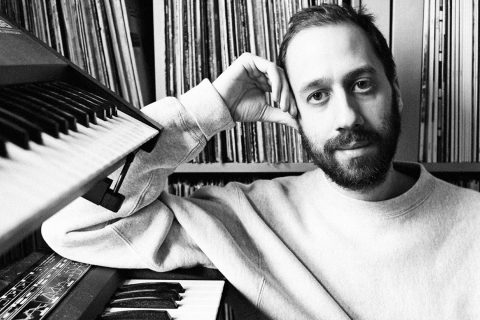
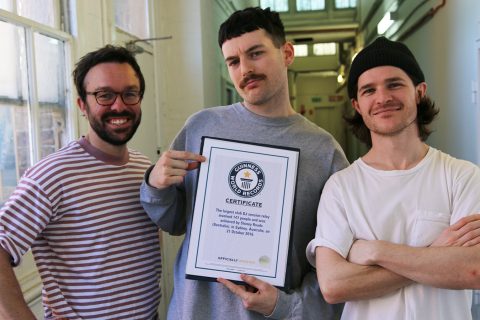
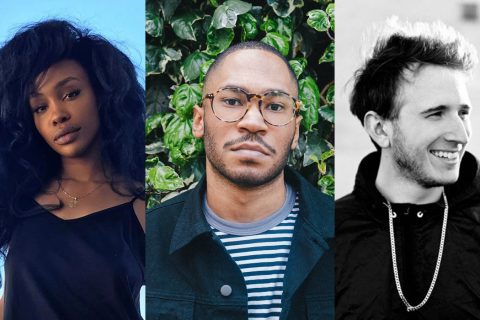
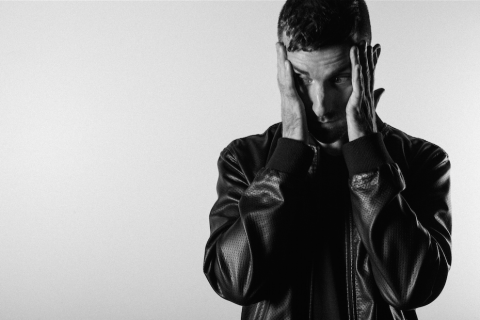
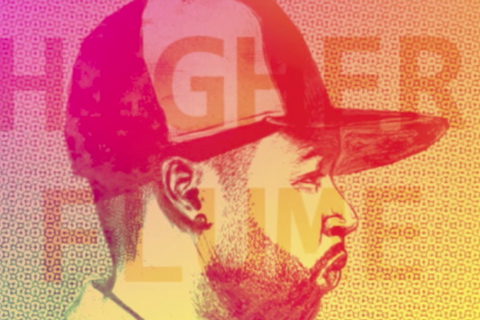
Comments